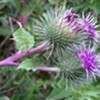Update on Phase I Studies in Advanced Pancreatic Adenocarcinoma. Hunting in Darkness?
Abstract
Over the last twenty years, there is a limited number of effective cytotoxic or biological agents that managed to get approval in advanced pancreatic ductal adenocarcinoma. Despite numerous trials, investments in translational research and generally in health care, the survival of pancreatic cancer patients has improved by a few only months. This disappointing reality necessitates a better understanding of the pathogenesis of this disease and the identification of targetable alterations which might lead to development of more effective drugs or better combinations. At the 2013 Annual Meeting of the American Society of Clinical Oncology, few novel agents and new therapeutic concepts, tested in phase I studies in advanced pancreatic ductal adenocarcinoma, were presented. The first notable phase I study referred to the combination of chemotherapy with local delivery of silencing RNA against the K-ras mutation G12D, in advanced pancreatic ductal adenocarcinoma, which was well tolerated and promising (Abstract #4037). The second one referred to a combination of gemcitabine with pegylated recombinant human hyaluronidase (PEGPH20), an inhibitor of hyaluronan which as a matrix glycosaminoglycan is believed to play role in the reduced drug delivery to cancer (Abstract #4010). The other notable abstract was related to an early phase study which tested the safety and toxicity of arctigenin, a traditional herbal agent found in Arctium lappa Linné, administered as an oral formulation (GMS-01) in pancreatic ductal adenocarcinoma patient resistant to standard chemotherapy (Abstract #2559). The aforementioned early phase studies open new therapeutic approaches which deserve further testing in advanced pancreatic cancer.
Image: The biennial plant Arctium lappa Linné.
Downloads
References
Siegel R, Naishadham D, Jemal A. Cancer statistics, 2013. CA Cancer J Clin 2013 Jan;63(1):11-30. [PMID-23335087]
Von Hoff DD, Ervin TJ, Arena FP, Chiorean EG, Infante JR, Moore MJ, et al. Randomized phase III study of weekly nab-paclitaxel plus gemcitabine versus gemcitabine alone in patients with metastatic adenocarcinoma of the pancreas (MPACT). J Clin Oncol (Meeting Abstracts) 2013 Jan 30;31(4_suppl):LBA148.
Conroy T, Desseigne F, Ychou M, Bouche O, Guimbaud R, Becouarn Y, et al. FOLFIRINOX versus gemcitabine for metastatic pancreatic cancer. N Engl J Med 2011 May 12;364(19):1817-25. [PMID-21561347]
Burris HA, III, Moore MJ, Andersen J, Green MR, Rothenberg ML, Modiano MR, et al. Improvements in survival and clinical benefit with gemcitabine as first-line therapy for patients with advanced pancreas cancer: a randomized trial. J Clin Oncol 1997 Jun;15(6):2403-13. [PMID-9196156]
Golan T, Hubert A, Shemi A, Segal A, Dancour A, Khvalevsky EZ, A phase I trial of a local delivery of siRNA against k-ras in combination with chemotherapy for locally advanced pancreatic adenocarcinoma. J Clin Oncol 2103; 31(Suppl.): Abstract #4037.
Strimpakos A, Saif MW, Syrigos KN. Pancreatic cancer: from molecular pathogenesis to targeted therapy. Cancer Metastasis Rev 2008 Sep;27(3):495-522. [PMID-18427734]
Hingorani SR, Harris WP, Beck JT, Berdov BA, Wagner SA, Pshevlotsky EM, et al. A phase Ib study of gemcitabine plus PEGPH20 (pegylated recombinant human hyaluronidase) in patients with stage IV previously untreated pancreatic cancer. J Clin Oncol 2103; 31(Suppl.): Abstract #4010.
Provenzano PP, Hingorani SR. Hyaluronan, fluid pressure, and stromal resistance in pancreas cancer. Br J Cancer 2013 Jan 15;108(1):1-8. [PMID-23299539]
Jacobetz MA, Chan DS, Neesse A, Bapiro TE, Cook N, Frese KK, et al. Hyaluronan impairs vascular function and drug delivery in a mouse model of pancreatic cancer. Gut 2013 Jan;62(1):112-20. [PMID-22466618]
Ikeda M, Sato A, Mochizuki N, Toyosaki K, Miyoshi C, Fujioka R, et al. A phase I trial of GBS-01 for advanced pancreatic cancer refractory to gemcitabine. J Clin Oncol 2103; 31(Suppl.): Abstract #2559.
Hayashi K, Narutaki K, Nagaoka Y, Hayashi T, Uesato S. Therapeutic effect of arctiin and arctigenin in immunocompetent and immunocompromised mice infected with influenza A virus. Biol Pharm Bull 2010;33(7):1199-205. [PMID-20606313]
Yang S, Ma J, Xiao J, Lv X, Li X, Yang H, et al. Arctigenin anti-tumor activity in bladder cancer T24 cell line through induction of cell-cycle arrest and apoptosis. Anat Rec (Hoboken ) 2012 Aug;295(8):1260-6. [PMID-22619087]

Copyright (c) 2014 Alexios S Strimpakos, Muhammad Wasif Saif

This work is licensed under a Creative Commons Attribution 4.0 International License.
As a member of Publisher International Linking Association, PILA, iMedPub Group’s JOP follows the Creative Commons Attribution License and Scholars Open Access publishing policies. Journal of the Pancreas is the Council Contributor Member of Council of Science Editors (CSE) and following the CSE slogan Education, Ethics, and Evidence for Editors.